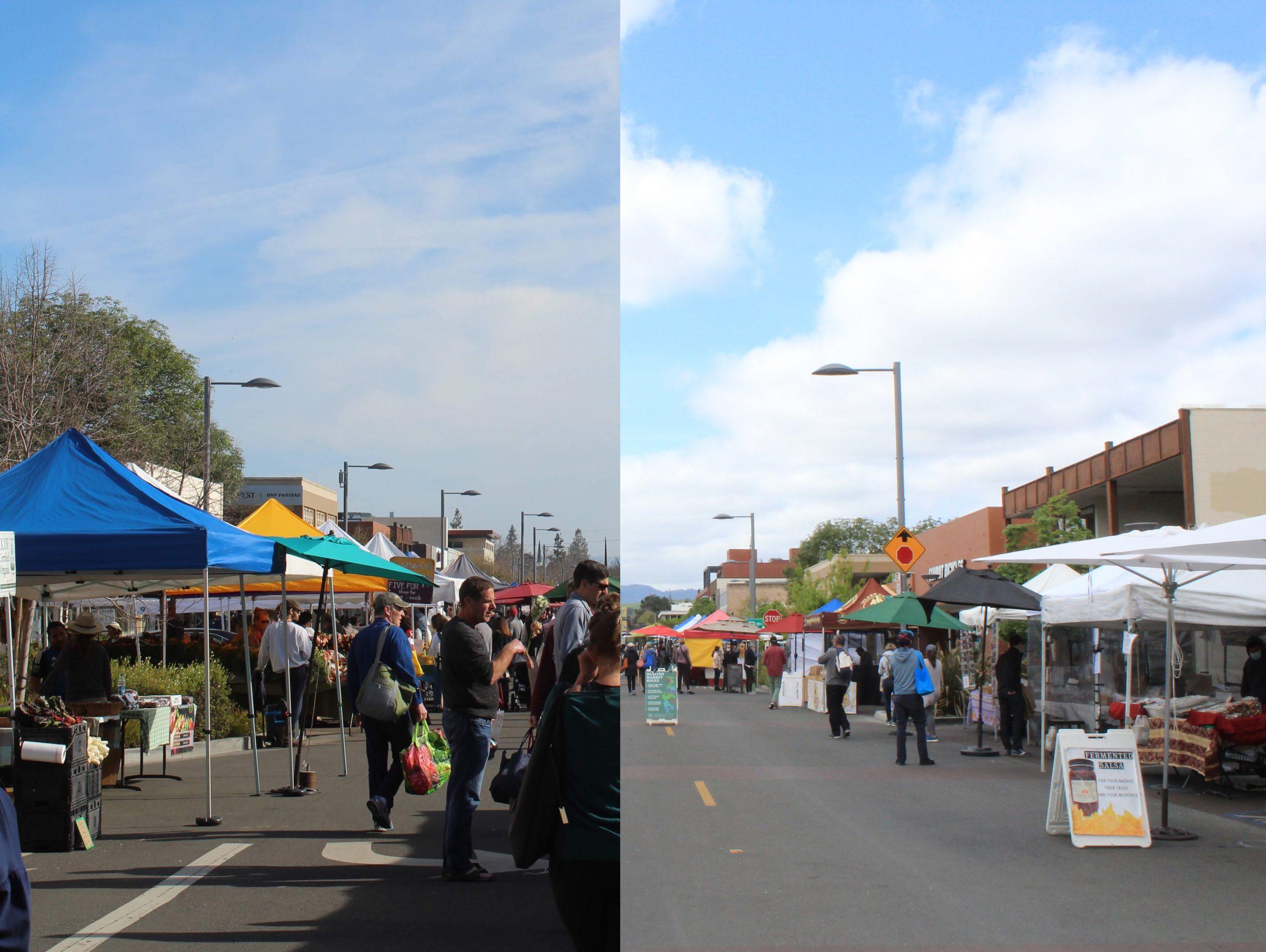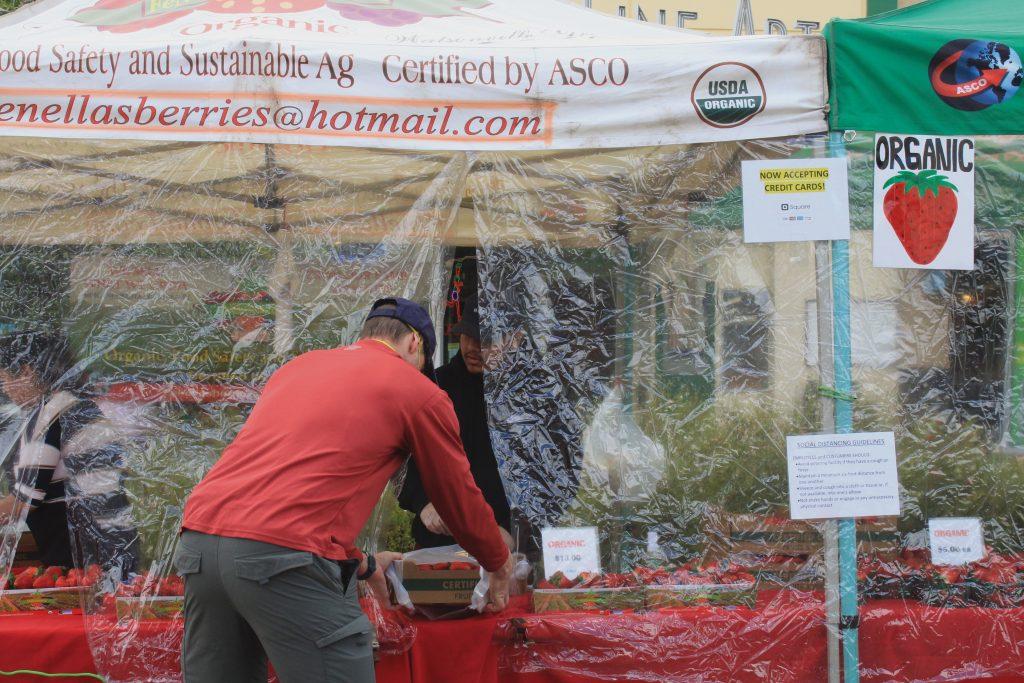It’s 8 a.m. on April 19, a shining Sunday morning. Local consumers are just starting to wake up to head over to the farmers’ market, whereas farmers and vendors from the Central Valley have been awake since the crack of dawn, preparing for the busy day ahead. However, their routines have changed these last couple months as they now carry with them their hand sanitizer, masks and gloves.
Every Sunday on California Avenue in Palo Alto, a local farmers’ market takes place. Stands selling products ranging from the crunchiest apples to the sweetest honey to the richest rotisserie chicken are stationed up and down the closed-off street, practicing appropriate social distancing.
Duct tape and chalk markings line the floor, signs advocating for safety measures are scattered across the scene and people are careful to avoid the other shoppers. While the farmers’ market is still happening, it’s different.
Even though the spread of COVID-19 has put most of the world on hold, essential businesses, like farmers’ markets, remain open.

What’s new?
With the rise of COVID-19, many people have had to change their daily routines to adapt to the “new normal.”
The market is still open for business every Sunday, but changes have been implemented to ensure the safety of both the sellers and consumers.
A common protocol among all of the stand owners is that customers cannot pick out their food themselves in order to reduce the risk of exposure. Many farmers have put up signs with the text, “No mask, no service,” a safeguard to prevent disease transmission during the pandemic.
“We spend our entire days working, growing food to make sure … you can get organic, local, good food and that’s our pride.”
— Gunther Gettelfinger, sales representative
Additionally, the farmers’ market has taken steps to comply with the shelter-in-place rules, including social distancing. Up and down California Avenue, markings spaced six feet apart can be seen on the ground to help guide visitors to keep a safe distance when standing in lines.
In the middle of the market is the information booth. Here, Jesse Garcia, one of the Palo Alto farmers’ market managers, sits wearing a mask, next to a massive bottle of hand sanitizer, and answers questions from passersby. He plays a key role in establishing and implementing the rules and precautions to create a safe environment where vendors can still sell their fresh produce.
“Since the farmers’ market is in an open space and we aren’t bordered by the walls of a store, we have the freedom to really space people out,” Garcia said. “We’ve made sure to put at least 10 feet between each stand because we’re all about the safety of the vendors and consumers.”
Click on the interactive image to view the different safety precautions both customers and sellers have taken in light of COVID-19.
Behind the business
Seeing as the farmers’ market is an essential business, Palo Alto residents should not be surprised by the fact that it is still open for consumers. Providing people with fresh, organic produce, the market promotes health in multiple forms.
According to Victoria, a weekly customer at the market, she continues to attend to support the local farmers and to take advantage of the high-quality, organic produce available. She explains that while some things have changed in order to maintain health precautions, she returns every week to get the same, exceptional food.
Multiple vendors say that since the beginning of the shelter-in-place order, business has increased.
“Business has soared like it hasn’t since at least 2015 because we have high in-demand products,” Capay Farms employee Dustin said.
Trinity Murchie, a marketing director and employee at the farmers’ market, explains the consequences of such an influx.
“We’re all hitting our Christmas numbers and going beyond that,” Murchie said. “We ended up selling out and it’s beautiful for the weekend, but then we don’t have anything to sustain the customers next weekend. So a lot of us are scrambling and trying to figure out how to accommodate people.”
Another employee at the farmers’ market, sales representative Gunther Gettelfinger, explains how the increase in purchases by consumers has already impacted the sheep dairy company that he works for.
“We’re already out of all meat for the entire spring and summer, because people were coming in and instead of buying one pound of ground lamb for the weekend, they were buying ten pounds of ground lamb at a time,” Gettelfinger said.
Even though things may be salutary at the moment for many local farmers and vendors, the economic consequences will likely continue to be felt in the future.
“We’re all hitting our Christmas numbers and going beyond that … but then we don’t have anything to sustain the customers next weekend.”
—Trinity Murchie, marketing director
According to Murchie, some of the many benefits of getting produce from the market is that it is safer, healthier and easier to regulate than a grocery store in times like these.
“By the time you see the shelf at Safeway, that item has been handled 10 to 30 times, whereas this [farmers’ market produce] has only been handled by about three different people,” Murchie said.
Everyone at the farmers’ market is not only motivated by the safer atmosphere, but also by the desire to support small, local businesses.
“We’re coming to the market because not only is it a farmer’s lifeblood, it [the farmers’ market] is the lowest risk grocery store that there is around,” Murchie said. “I’m also helping the farmer get the little bit of money that he makes every year.”
Farmers and vendors continue to come out and sell their products not only because it is their job, but also to continue to provide for the people around them. For many customers, the farmers’ market is, and will always be, their main way of obtaining high-quality produce.
“There was a sticker that I saw on a truck one time and it said, ‘If you love people, you feed them good food,’” Gettelfinger said. “We spend our entire days working, growing food to make sure … you can get organic, local, good food and that’s our pride.”
RELATED STORIES
Discovering the Farmers Market
How Do You Like Them Apples?: Community enjoys the expanded California Avenue Farmers Market
Palo Alto Goes Green: Local community chooses sustainability




